| Author | Message | ||
Oldog |
I was pretty sure that I thought this through. cold makes small hot makes big so get the parts real hot and real cold. I guess a little better explanation is in order I have had a desire to powder coat My pm rims for a while, to do this you must remove the bearings and all other non metal items, the rims will be heated to 450 f as part of the process While doing the anual IRAN I discovered that the wheel bearings were failing so they had to be changed. PM wheels OUT is easy heat the hub faces with a propane torch ( remove pully / rotor etc ) they will fall out. I THINK that IF the mounting face is mancihned clean with no PC you may be able to carefully heat the cast wheels on a machined face and do the same, but I have not tried it. YMMV I gathered up all of the bits that I thought I would need to do this job, 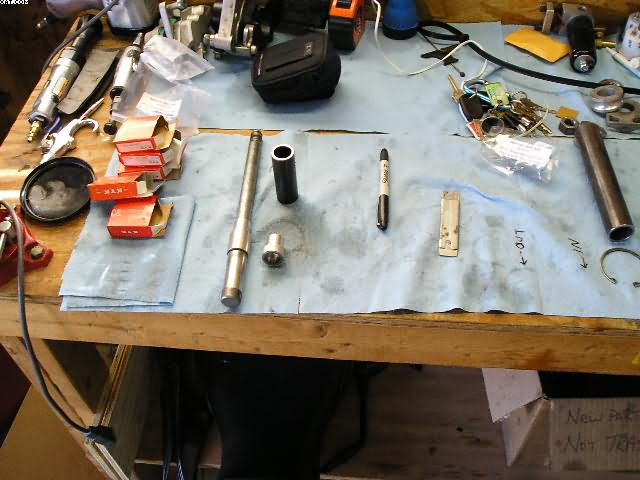 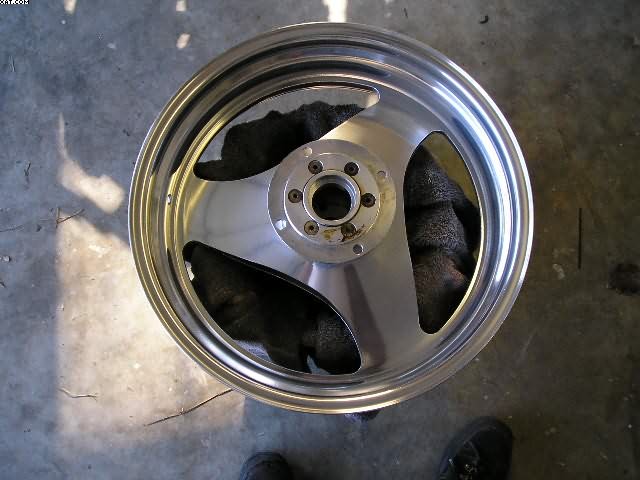 I placed the Bearings still in the wrappers in DRY ICE I marked the usage on the wrapper and covered them with the co2 pellets for one hour to cold soak.   I started with the rear wheel, the break side bearing is installed first, Its shouldered and will locate the spacer pipe correctly, this went exactly as intended I just dropped it into the hole and it went home with finger pressure.  (Message edited by oldog on January 07, 2007) | ||
Oldog |
 heres the rim with the brake side bearing bore up this is shallow and shouldered at the bottom with a retaining ring on the outside. this bearing locates the spacer and the other bearings relative the wheel.  The PC guy had concerns about the PC taking the heat and/or flames I can see if the plastic coating is subjected to flames it would char or blister it is fused at 450 f and we are looking for about 400f idealy  Like I said this one went in easy, the "FUN" err was about to start. | ||
Oldog |
 I placed the spacer pipe in the wheel with the axle to hold it in place, the rim rests on the lip of a 5 gallon bucket with an old bath towel over it I adjusted the position of the towel to allow the axle to stay just flush of the spacer, 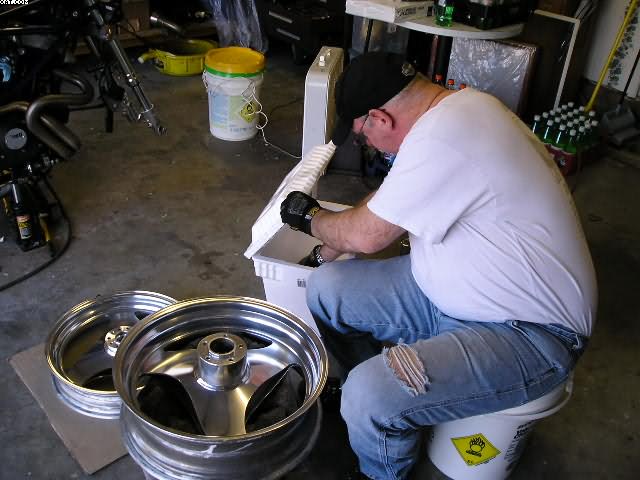 the second bearing stuck in the mouth of the bore, I either failed to get the hub hot enough or contact with the bearing at -200f or there abouts caused it to shrink 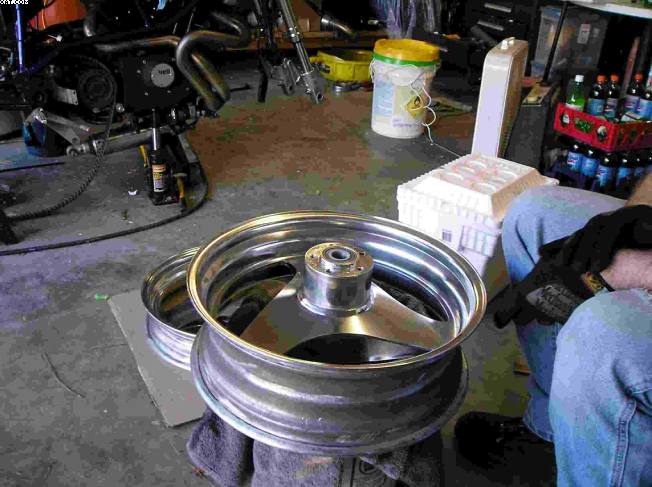 this is where the story goes south, I do not own any sockets the size of the outer race so I placed a piece of steel flat bar that I do have across the entire bearing and tapped, then smacked, then got the bigger hammer and hit hard the bearing went in hard, I took a round bar and tapped (Pounded) on the edge of the outer race, adding heat to the rim as I went, this seemed to help, when the inner bearing was set I got the outler one and prepaired to do battle, it dropped into the hole like the first one. The front wheel was a fight all the way and I had a bad time getting the bearings against the spacer pipe again heat seemed to help this, when complete and cooled the bearings are rough!@#$%@#$% so ~80$ worth of bearings to remove and replace, again. Things I will do differently, I am going to take the old bearings that I removed and gring the edges down so that they Fall in and out of the hole these will be used for "driving" I will probably remove the centers and seals too and attach them to a bar of some kind to give me some thing to strike for driving Other misceleny, one hammer blow missed and hit the hub leaving a ding  the object I was striking poped out of my hand and nicked the wheel ( tiny )  Oh and another set of bearings  (Message edited by oldog on January 07, 2007) | ||
Henrik |
Ouch ... Shop press or some threaded rod might be worth considering? Henrik | ||
Oldog |
Henrik: I thought about that, If I had access to a machine shop that is what I would have attempted, I still would have used heat /cold to reduce the interfierence, I may build the tools any way, the trick is to start the bearing straight and pull it straight heavy thread rod 3/4" might work as the front wheel bearings are 3/4" or close to it the presser "nut" would have to be long enough to be guided in straight by the thread rod a ground down bearing can be used as a push block Thanks for the suggestion oh BTW I hope that your Holiday was excellent.. | ||
Justin_case |
Your plastic bucket absorbs too much of the hammer blow. The wheel needs to be on something really solid. | ||
Al_lighton |
My observations, from similar experiences: 1) The socket/hammer method is bad and shouldn't be used. The force needs to be normal to the wheel, and the hammer blow can not reliably do this. It results in walking the bearing in and will ruin the wheel. You will only get a couple bearing swaps before the bearing bore will be roached with this method. There is already too much tendency to spin rear wheel bearings on the pulley side, this won't help. 2) The threaded rod method can work, but only if the threaded rod is the same diameter as the axle, or is sleeved up to that diameter. If it is not, the bearings won't stay perpendicular to the bore, even though they may be parallel to each other. But I don't like the threaded rod method, it is too slow. The cold bearings and the hot wheel have too much time in connection with each other, swapping heat and expanding the bearing and contracting the bore, making the fits and the interference tighter and the wheel stress higher. That's why I bought a Harbor Freight press. With the press, I can push with a normal force, and it all happens fast, with low forces because the temperature differential stays there for the entire operation. Al | ||
Al_lighton |
BTW, I just put them in the freezer. Ice water is 32F. The freezer is considerably colder. Colder is good. AL | ||
Oldog |
Thanks "Justin" I had not considered that Tools are in process, the press would be best, but we dont have one that I can use at work, ours is operated by an enerpack and you have to drag out a bunch of stuff to use it. BTW Thanks AL | ||
Oldog |
I removed the wrecked bearings tonight, using the heating method, no PC issues  Whew! Whew! I came to at least two conclusions about some of the grief, .......... #1 I needed to heat the hubs more than I did because of the Co2 Frozen bearings, as long as the torch flame does not hit the powder coat its good the bearings that were tapped out were in wheels setting on padded chairs ie little force is required. ..........#2 I did not have push blocks and other items needed that I SHOULD have had on hand ready to go on the hang up and I did not stay calm ..........#3 I got hammer happy and get to pay stupid tax. NOW FOR SOME GOOD NEWS ............#1 the front Pm wheel has blocks bolted to the hub that carry the bearings Heres why I think that.  I have been looking at these things for days and thought about this past weekend, there are numbers visible INSIDE the hub bore on the back of the other side inside its not a smudge, the bolts here serve no purpose except to hold the block and locate it. 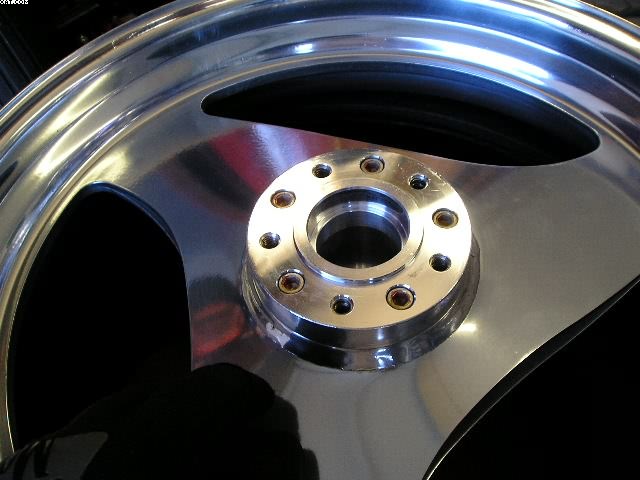 here notice the line above the weld bead its recessed on the weld side and sharp cornered on the block ( minute I have looked quite closely at these re polishing them ) Also the tapped holes are small diameter, tapped full diameter to the bottom and the holes have a flat bottom not do able by any process that I am familiar with The rear wheel is built differently and the blocks are more like plugs welded on at the side and machined 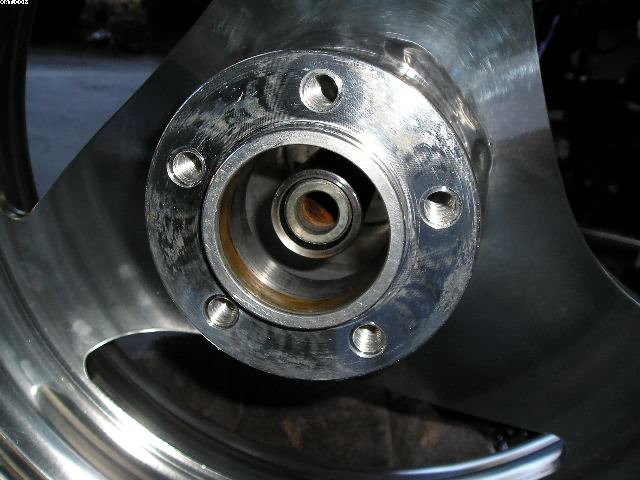 these holes penetrate to the inside of the hub space you can see the reduced shoulder inside from the reverse angel these are welded and machined |